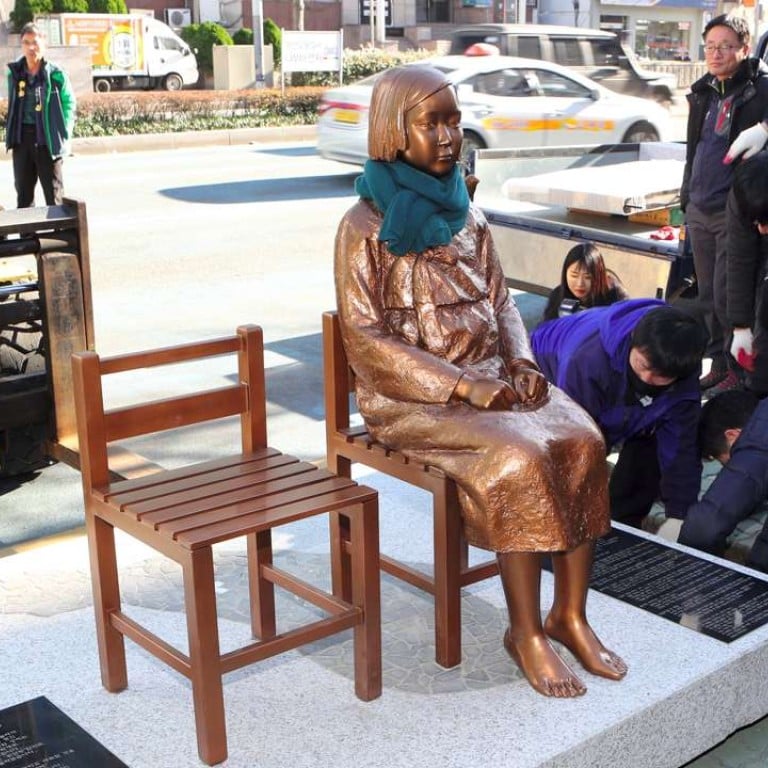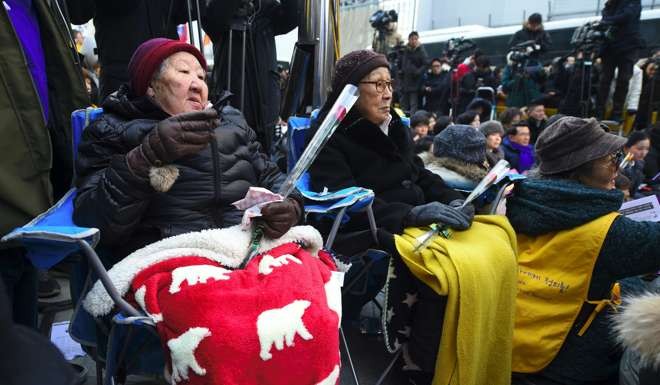
Why Korea’s ‘comfort women’ must be remembered
Memorials to those forced into sex slavery during the second world war are not about disgracing Japan, but symbols acknowledging sufferings that must never be forgotten
Last week the diplomatic row between South Korea and Japan escalated when a statue commemorating “comfort women” – sex slaves forced by Japan to work in military brothels during the second world war – was installed outside the Japanese consulate in Busan.
Japan responded by recalling its ambassador to Seoul and consul general to Busan, and suspending discussions on a bilateral currency swap agreement with South Korea.
The diplomatic crisis is not simply a reopened historical rift between two countries with a traumatic past. It reveals a current struggle between individual human rights and state politics.
WATCH: Japan to recall its South Korea envoy over ‘comfort women’ statue
The Busan statue was dedicated to the hundreds of thousands of girls and women who were detained in the Japanese military “comfort stations” as sex slaves during Japan’s aggression in Asia (1931-1945). It’s not the first time such a statue has triggered a problem in Korean-Japanese relations. In fact, it is a copy of a similar statue that was erected in 2011 near the Japanese embassy in Seoul by citizen groups.
The statue marks the site where former Korean “comfort women” and their supporters have rallied every Wednesday since 1992 – it was built to mark the 1,000th rally demanding Japan take responsibility.
The Peace Monument, as the statue in Seoul is known, remains to this day and has inspired the construction of similar statues around the world – the Busan one included.

The memorials have prompted a bitter response from Tokyo, which has requested their removal from the United States and other places.
In December 2015, Tokyo struck a deal with Seoul claiming the “final and irreversible resolution” of the “comfort women” issue.
Under the agreement, Prime Minister Shinzo Abe made an apology to those who “suffered incurable physical and psychological wounds as comfort women” and Japan gave 1 billion yen (HK$68 million) to a South Korean fund to help former “comfort women”.
Reconciliation cannot wait for the ‘comfort women’ victims of wartime Japan
In return, South Korea acknowledged Japan’s concern about the statue in Seoul and indicated it would “solve” the issue in an appropriate manner.
However, many were quick to criticise the deal, which was struck by the two governments without consulting the victims. The agreement did not contain a Japanese acknowledgement of legal responsibility, nor did it provide direct compensation to individual victims.

Moreover, the deal was seen as a product of geopolitics: the tension between the two US allies had compelled Washington to mediate.
Japan says the Busan statue has violated the 2015 agreement, but to the survivors and their supporters, the statue is a display of resistance to an agreement they never accepted. Seoul faces a dilemma: it is under pressure from Japan to remove the statue and from its own citizens to keep it.
Thus the memorial has been turned into a site of a geopolitical power struggle.
South Korean self-immolates over ‘comfort women’ deal with Japan, as PM Abe urges Seoul to remove new statue
However, despite the political distortion, most people do not see the memorial as an object to disgrace Japan, but as a symbol acknowledging human sufferings – sufferings we should not and cannot forget.
Survivor Park Rae-sun tells us what she cannot forget. In 1941, she was taken from her hometown Kyongsangnam-do to Fushun, China, with 30 Korean girls and women as Japanese aggression accelerated. She was told that the women were being recruited for cooking, laundry and nursing jobs, but once they arrived, they were detained in a walled compound near a military barracks.
“They dragged us to beds violently and raped us,” recalls Park. “The compound was filled by chaotic sounds: crying, cursing, struggling, tearing clothes, and lecherous laughing. Girls who resisted rape were beaten up; their entire bodies were covered with bruises. That was March 16, 1941, a day of humiliation I would never forget.”

Park was raped multiple times a day. A year later she was taken on a battleship to south China and confined in a comfort station with other women drafted from the Korean Peninsular, Taiwan, and Southeast Asia.
They were forced to service Japanese troops day and night, and were also sent to remote locations to “comfort” the soldiers. Sexual torture at these locations was particularly brutal as the soldiers raped the women one after another ceaselessly. The ordeal continued until August 1945 when the Japanese military was defeated.
WATCH: South Korea, Japan reach landmark agreement to resolve ‘comfort women’ issue
Many of the “comfort women” didn’t survive to tell us their suffering. For them and for us, the memorial is a symbol of hundreds of thousands of lives destroyed by the war. The plight of the women teaches us profound lessons about conflict-related sexual violence. In today’s world when sexual violence continues to be an instrument of armed conflicts, the memory of these sex slaves constitutes a legacy of global significance.
Whether the Busan statue remains or is removed, the memory of the “comfort women” will continue to educate us and future generations, promoting transnational efforts to prevent crimes against humanity. ■
Peipei Qiu is professor of Chinese and Japanese at Vassar College and the author of Chinese Comfort Women: Testimonies from Imperial Japan’s Sex Slaves

